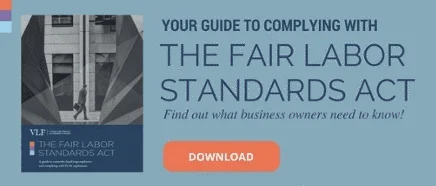On March 13, 2014, President Obama declared “Americans have spent too long working more and getting less in return.”
He then ordered the Labor Department to change federal rules on overtime and raise the required salary amount needed before an employee could qualify under exemptions under the Fair Labor Standards Act (“FLSA”). This order came after President Obama, by executive order, increased the minimum wage for workers under federal contracts to $10.10 an hour. Because of this, many businesses have rightfully began to worry if their company is compliant with the FLSA.
Pursuant to the FLSA, an employer who violates the act can face cumbersome record searches by the Department of Labor. Further, businesses can face both public and private lawsuits, including class action suits. Damages in the lawsuits include all determined unpaid or underpaid wages, an equal amount as liquidated damages, and attorney fees if the employer is found to be in violation of the act. From 2012 to 2013, FLSA cases rose 10 percent, and with recent attention by President Obama, those numbers do not look to be declining any time soon.
Does your business need to comply with the Fair Labor Standards Act?
Download the FLSA guide today!
Under the FLSA an employer is required to pay a minimum wage (currently $7.25 an hour unless under a federal contract as mentioned above) and pay overtime at a rate of 1.5 times the employees “regular rate” for all hours worked over 40 hours (also referred to as time-and-a-half). These requirements apply to all “non-exempt” employees.
Just because an employee is compensated on a salary basis does not mean the employer does not need to pay overtime. Generally, for an employee to be considered exempt under the FLSA, with few exceptions, they must (1) be paid at least $23,600 per year ($455 per week), and (2) perform exempt job duties. Further, unless the position sought to be classified as exempt is a sales position or certain professions, such as a doctor or lawyer, the position must also have a fixed salary amount that is not reduced based on quantity or quality of work performed.
However, the amount of $455 per week has been ordered increased by the Obama administration. Any increase dictated by the Labor Department would not take effect immediately. The Labor Department will have to publish the new rule, and businesses and labor groups will be given the opportunity to make comments. However, this does not mean the required minimum pay per week will not rise, and businesses must pay attention to any change by the Labor Department.
Even more, employers seeking to classify an employee as exempt must insure that the employee is primarily performing exempt job duties. Exempt employees are classified as Executive, Administrative, Professional-Learned and Artistic, and outside salesman.
Primary duties of an executive employee consists of: managing the enterprise, regularly directing at least 2 or more employees and the ability to hire or fire employees.
An administrative position performs as its primary duty: office work or non-manual labor directly related to management or business operations, use of discretion with important matters of business. This exemption is usually meant for human resource managers, executive assistants, and management consultants.
A Professional-Learned and Artistic Exemption applies to 1) professionals such as doctors, lawyers, teachers, accountants, pharmacists, engineers, etc., and generally any person with advanced knowledge in a certain field and whose work specialized; and 2) artistic/creative professionals such as actors, composers, painters, and any position requiring originality and imagination for the above jobs.
An outside salesman has primary duties involving; 1) making sales or obtaining orders/ contracts for services, 2) engaged away from the employer’s place of business in performing that duty and 3) more than 50% of income is derived from those sales.
Whether an employee falls within one of these exemptions is not always easy to determine, and comes down to the facts in each situation by each individual employee. The particular facts of each employee and position must be carefully considered before an employer foregoes paying overtime. Further, the FLSA places the burden of record keeping for hours worked (in a day and per week) and rate of pay squarely on the employer. The choice of a business to designate an employee as exempt and fail to keep those records can be fatal if it is later determined that an exemption does not apply.
Every business owner and employer should carefully consider how they are paying their employees and if they are in danger of violating the FLSA. Simple steps to take initially should be to never assume that employees are exempt simply because they are paid a salary and create a written policy and procedure manual that non-exempt employees are not authorized to work overtime without prior approval. This will prevent an employer from having to pay surprise overtime.
The attorneys at VLF routinely assist businesses in corporate governance, employment law matters, and assist in implementing policies to protect a business. Our attorneys are here to help businesses protect themselves from legal issues so that businesses can worry about doing what they do best. We encourage any questions and look forward to working with you and your management team to address your business and corporate concerns.

